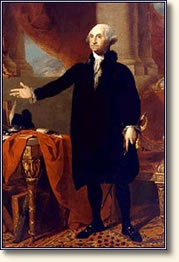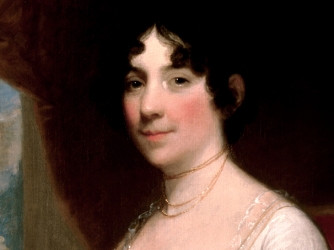Following up on their victory at the Battle of Bladensburg on August 24, 1814 British troops bore down on the nation’s capital at Washington only a few miles distant. Their objective was to destroy the city’s governmental buildings and raise as much havoc as possible. Witnessing his army’s defeat, President Madison hurriedly scribbled a message to his wife Dolley, who had remained at the White House, to immediately flee the city.
The atmosphere at the Presidential Mansion was one of controlled panic. The First Lady prepared to flee taking with her as many state documents and other prized possessions as she could hurriedly gather. Among these was a full-length portrait of George Washington that hung in the State Dining Room. She was aware that the British troops had boasted that, if they captured her, she would be sent to England in irons and exhibited on the streets of London. This knowledge only accentuated the importance of her escaping the city as soon as possible.
“I must leave this house, or the retreating army will make me a prisoner in it”.
Some years later, Dolley Madison recreated the scene at the White House that day in a letter to her sister:
“Dear Sister -
My husband left me yesterday morning to join General Winder. He inquired anxiously whether I had courage or firmness to remain in the President’s house until his return on the morrow, or succeeding day, and on my assurance that I had no fear but for him, and the success of our army, he left, beseeching me to take care of myself, and of the Cabinet papers, public and private.
I have since received two despatches [sic] from him, written with a pencil. The last is alarming, because he desires I should be ready at a moment’s warning to enter my carriage, and leave the city; that the enemy seemed stronger than had at first been reported, and it might happen that they would reach the city with the intention of destroying it. I am accordingly ready; I have pressed as many Cabinet papers into trunks as to fill one carriage; our private property must be sacrificed, as it is impossible to procure wagons for its transportation.
I am determined not to go myself until I see Mr. Madison safe, so that he can accompany me, as I hear of much hostility towards him. Disaffection stalks around us. My friends and acquaintances are all gone, even Colonel C. with his hundred, who were stationed as a guard in this inclosure [sic].
French John [a faithful servant], with his usual activity and resolution, offers to spike the cannon at the gate, and lay a train of powder, which would blow up the British, should they enter the house. To the last proposition I positively object, without being able to make him understand why all advantages in war may not be taken.
Wednesday Morning, twelve o’clock.-
Since sunrise I have been turning my spy-glass in every direction, and watching with unwearied anxiety, hoping to discover the approach of my dear husband and his friends; but, alas! I can descry only groups of military, wandering in all directions, as if there was a lack of arms, or of spirit to fight for their own fireside.
 The portrait of Washington that Dolley Madison saved |
Three o’ clock – Will you believe it, my sister? We have had a battle, or skirmish, near Bladensburg, and here I am still, within sound of the cannon! Mr. Madison comes not. May God protect us! Two messengers, covered with dust, come to bid me fly; but here I mean to wait for him. . . At this late hour a wagon has been procured, and I have had it filled with plate and the most valuable portable articles, belonging to the house. Whether it will reach its destination, the Bank of Maryland, or fall into the hands of British soldiery, events must determine.
Our kind friend, Mr. Carroll, has come to hasten my departure, and in a very bad humor with me, because I insist on waiting until the large picture of General Washington is secured, and it requires to be unscrewed from the wall. This process was found too tedious for these perilous moments; I have ordered the frame to be broken, and the canvas taken out. It is done! and the precious portrait placed in the hands of two gentlemen of New York, for safe keeping.
And now, dear sister, I must leave this house, or the retreating army will make me a prisoner in it by filling up the road I am directed to take. When I shall again write to you, or where I shall be tomorrow, I cannot tell!”
Source: EyewitnesstoHistory.com
Comment |

 Share on Facebook
Share on Facebook
 Tweet
Tweet
 Add My Story
Add My Story







